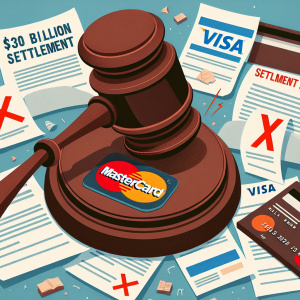A recent court decision has sent shockwaves through the financial and retail sectors as a judge has rejected a $30 billion settlement agreement between Visa, Mastercard, and a large group of merchants. The settlement aimed to resolve a long-standing dispute over interchange fees, the charges that merchants pay to banks when customers use credit cards. The ruling has significant implications for both the credit card industry and the vast array of businesses that rely on credit card transactions.
Judge Rejects $30B Visa-Mastercard Fee Settlement
In a landmark decision, U.S. District Judge Robert M. Jones declined to approve the $30 billion settlement proposed by Visa Inc., Mastercard Inc., and a network of banks, which had been intended to resolve a class-action lawsuit initiated by merchants. The lawsuit, which has been ongoing for over a decade, challenged the manner in which interchange fees, or "swipe fees," are set, arguing that the process is anti-competitive and inflates costs for retailers. The proposed settlement was touted as one of the largest in U.S. history, reflecting the extensive financial stakes involved.
Judge Jones criticized the settlement for being fundamentally flawed and unfair to many of the merchants involved. Specifically, the judge pointed out that the agreement did not provide adequate compensation for future damages and did not ensure that the credit card companies would make meaningful changes to their fee-setting practices. The ruling emphasized that the settlement primarily focused on compensating past damages without addressing the underlying issues that led to the dispute in the first place.
Moreover, the decision highlighted concerns about the fairness and transparency of the negotiation process. Many small and medium-sized merchants felt inadequately represented in the discussions that led to the settlement proposal. Judge Jones’s ruling stressed the need for a more equitable solution that considers the diverse interests of all affected parties, rather than disproportionately favoring larger corporations or financial institutions.
Decision Impacts Merchants and Credit Card Companies
The rejection of the settlement has immediate and far-reaching consequences for merchants across the United States. For many retailers, particularly small and medium-sized businesses, interchange fees represent a significant expense that affects their bottom line. The judge’s decision means that these merchants will continue to face uncertainty regarding the costs associated with accepting credit card payments. Without a clear resolution, businesses must navigate a complex and often opaque fee structure, which can vary widely depending on the card issuer and the type of transaction.
For credit card companies like Visa and Mastercard, the ruling represents a substantial setback. The companies had hoped that the settlement would bring closure to one of the most significant legal challenges they have faced in recent years. The continued legal battle not only prolongs uncertainty but also imposes additional legal expenses and potential reputational damage. The companies now face the prospect of either renegotiating a new settlement or preparing for further litigation, both of which come with their own risks and costs.
Beyond the immediate financial implications, the decision also has broader industry-wide ramifications. It signals increased judicial scrutiny of large-scale settlements and highlights the need for greater transparency and fairness in how fees are set and negotiated. This could pave the way for future regulatory reforms aimed at ensuring more competitive practices in the credit card industry. The ruling may prompt lawmakers and regulators to take a closer look at how interchange fees are structured and whether current practices align with principles of fair competition and consumer protection.
The rejection of the $30 billion Visa-Mastercard fee settlement by Judge Robert M. Jones marks a significant moment in the ongoing debate over interchange fees. The decision underscores the complexities and high stakes involved in reconciling the interests of merchants and credit card companies. As both parties grapple with the implications of the ruling, the case serves as a critical reminder of the need for equitable and transparent practices within the financial ecosystem. Moving forward, the industry will be closely watching for any shifts in regulatory attitudes and the potential for new, more balanced solutions to emerge.
